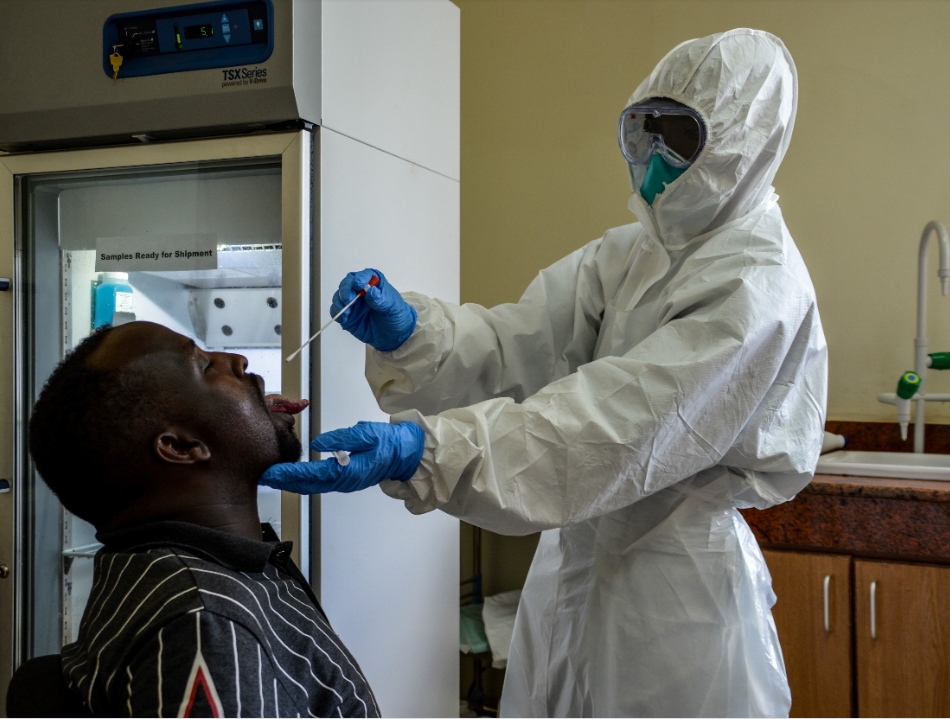The Ministry of Health and Twaweza are coming together to share critical information about Covid-19 testing and actions for self-protection amidst rising case numbers and fatalities in Uganda.Twaweza collected data from citizens in Kampala, Kyotera and Tororo to understand their knowledge about and actions around the virus. The most recent data were collected from 768 residents of Kampala,
639 residents of Kyotera and 622 residents of Tororo in June 2021. Twaweza has been collecting data around citizens’ knowledge, opinions and behaviours around Covid-19 since May 2020 to support government efforts to combat the pandemic.
Rates of testing have been steadily increasing as the pandemic progresses. In all three districts 1 out of 3 or more residents say that at least one person in their household has been tested for the Coronavirus, up from 1 out of 7 residents one year ago in July 2020: Kampala (35%), Kyotera (34%) and Tororo (40%).
Encouragingly, citizens also seem to be aware of and acting on the main protective measures:approximately 9 out of 10 residents in the three districts wear masks and/or wash their hands frequently. In Kampala 90% say they wash their hands regularly as their main action to protect against the Coronavirus and 86% say they wear masks. In Kyotera 86% wash their hands regularly while 83% wear masks, and in Tororo 89% wash their hands and 86% wear masks.
Some actions are understood more than they are carried out. For example, while almost half (47%) of Kampala’s residents said people should maintain at least two metres distance from other people, fewer than a third of them (32%) report actually doing this. Similarly, fewer people report avoiding public gatherings and public transport.
Citizens also seem to have varying degrees of information on where they are most at risk of contracting Covid-19. The largest proportion of residents in all three districts name work as the place they are most at risk of contracting Covid-19: Kampala (83%), Kyotera (89%), and Tororo (89%). Large urban centres are also named by 7 out of 10 residents of Kampala (65%), Kyotera (69%) and Tororo (78%). Other risky places are cited by fewer than 1 out of 3 residents of the three districts. Citizens in the three districts do not think social gatherings like weddings and funerals are high risk: Kampala (6%), Kyotera (2%), Tororo(4%).
Residents of the three districts are most concerned about adhering to the Covid-19 guidelines to protect themselves from contracting Covid-19 or from dying. In Kampala (13%), Kyotera (11%) and Tororo (11%), only 1 out of 10 citizens say that they are motivated by not wanting to spread the virus.
When asked what they would do and who they would contact in case of a suspected case of Coronavirus, residents of the three districts have similar views. In Kampala (78%), Kyotera (83%), and Tororo (88%), about 8 out of 10 residents would visit a health facility if they got sick. The next most popular option is to self-isolate at home, although fewer than half as many residents of the three districts say they would do this if they got sick. Staying at home is more popular in Kampala (38%) and Tororo (28%) than it is in Kyotera (19%). The third most cited action that residents of the three districts would take if they suspected they were sick is to use herbal remedies or local medicine: this is most popular in Kampala (28%) and to some extent Kyotera (22%) but not mentioned by many in Tororo (7%).
Violet Alinda, Twaweza Uganda Country Lead and Director of Voice and Participation, said “It is enccouraging to see high self-reported use of hand-washing and masks among citizens to protect themselves against Covid-19.However these data raise some concerns. Few people are saying that they practice social distancing, too many believe and rely on herbal medicine and they carry a number of misconceptions about where they are most at risk of contracting Covid-19. All actors working on communicating around Covid-19 can use these data to emphasize areas in which citizens’ knowledge and practices need to improve.”
Dr. Susan Nabadda, Commissioner Laboratory and Diagnostic Services and ED Uganda National Laboratory “The Ugandan Government is working hard to ensure the availability of tests and vaccines. However, in our context, testing is not a viable measure for self-protection – we do not have the test kits or the resources to facilitate multiple regular tests for citizens. In this context, we must emphasize the realistic protective measures that can be taken by all Ugandans no matter their location or economic status. We are pleased to see high uptake of handwashing and masks and we encourage citizens to continue making use of these important measures. However we also renew our call for citizens to practice social distancing and to educate themselves about and then avoid high risk places.”
